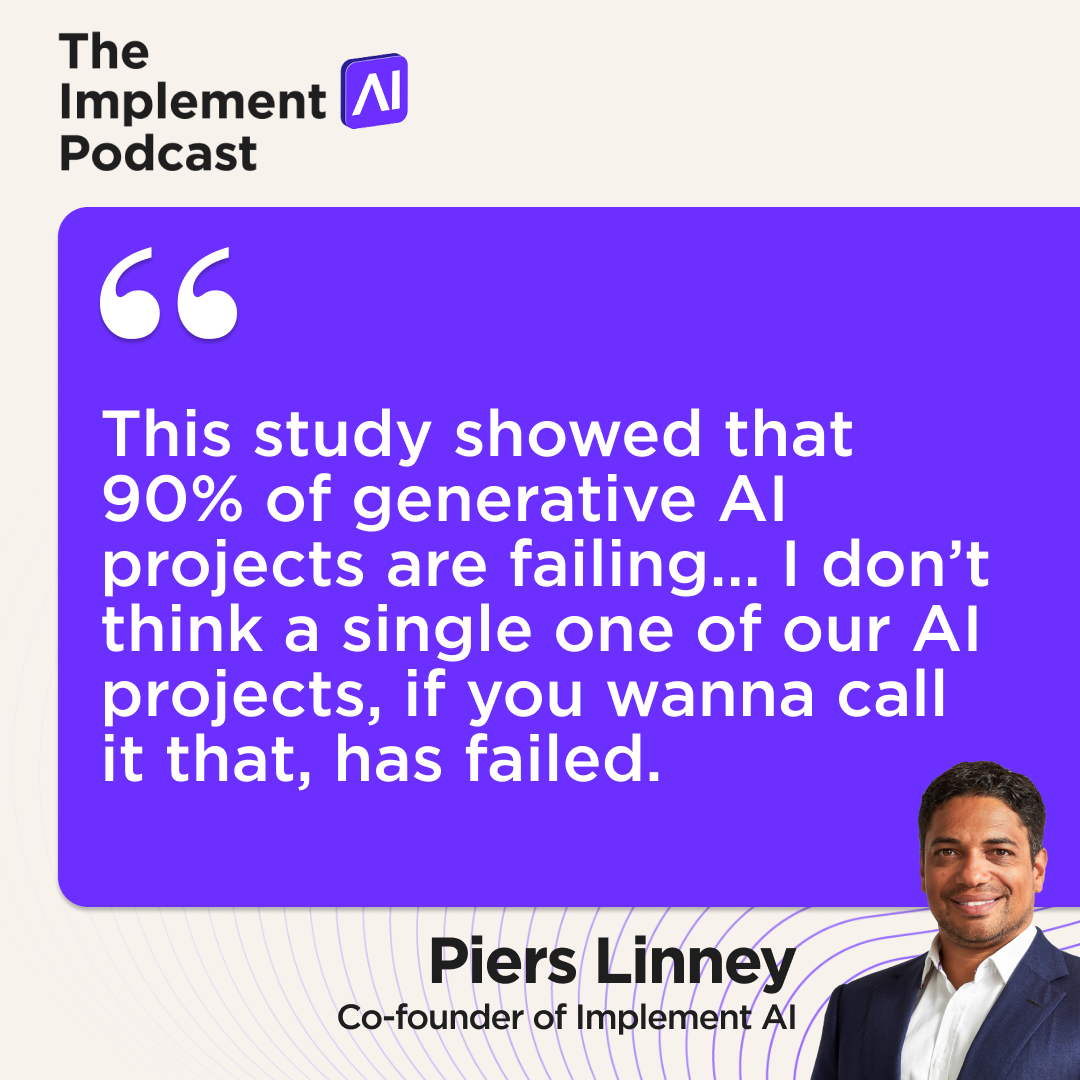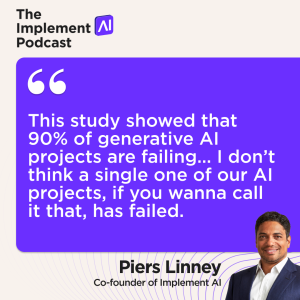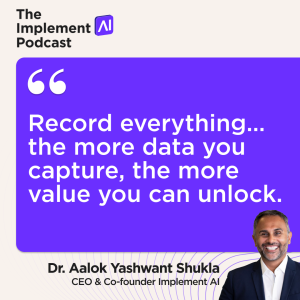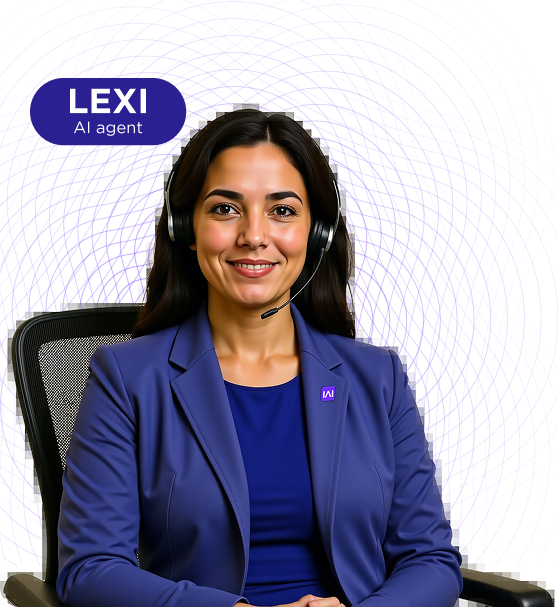The Implement AI Podcast #67 – Why 90% of Generative AI Projects Fail (and How to Avoid It)
September 9, 2025
What if I told you that most AI projects in business don’t just stumble, they collapse?
MIT’s latest research shows that 90% of generative AI projects fail.
That stat might sound shocking. But to us, it’s not surprising at all.
In this episode of The Implement AI Podcast, we (Piers Linney and Dr. Aalok Y. Shukla) take you inside the reasons why so many companies struggle to make AI work and what separates the failures from the successes.
From businesses treating AI like just another software project, to ignoring the gold already in their data streams, to over-engineering fragile workflows, we’ve seen the same patterns repeat. And after two years of hands-on deployments, we know exactly how to avoid them.
MIT’s Study and Why It Matters

When we read the MIT report about 90% of AI projects failing, we weren’t surprised; we’d seen the reality in the market.
Companies dive in with enthusiasm. They hire consultants. They buy new tools. They even stand up pilots internally. But six months later, they come back to us frustrated, budgets burned, and projects abandoned.
The difference is in the approach. AI isn’t a shiny piece of software you tack onto existing systems. It’s a fundamental change in how you operate.
The 17 Reasons AI Projects Fail
In this episode, we break down 17 common traps that kill AI projects before they scale. Here are just a few of the big ones:
- Building internally without expertise. It’s one thing to spin up a hobby agent; it’s another to create a production-grade, scalable, secure system.
- Hiring consultants who talk but can’t deliver. Beautiful slides and quick pilots don’t translate into long-term ROI.
- Over-relying on no-code platforms. Lego bricks are fine for a one-off task, not for enterprise-wide transformation.
- Starting with technology, not use cases. Cool tools without a business case lead nowhere.
- Ignoring the people who actually do the work. Frontline staff know the edge cases and the context AI needs.
- Treating AI like a software development project. This isn’t a project, it’s a permanent, evolving shift.
- Neglecting existing data streams. Calls, emails, and workflows are untapped gold mines.
- One-off projects that can’t be repeated. Without repeatability, ROI vanishes.
- Single-task agents that don’t collaborate. A digital worker should be part of a team, not a lone silo.
- Not taking stakeholders with you. Without buy-in from leadership to the front desk, projects stall.
Each one of these reasons is avoidable if you start with the right mindset.
Why Data Is Business Gold
One of the biggest mistakes we see is companies sitting on mountains of valuable data and doing nothing with it.
Think about recorded phone calls, support tickets, or email threads. For years, these were considered a cost to store. Now they’re pure opportunity.
We’ve seen businesses uncover six-figure revenue opportunities within weeks simply by analysing calls. We’ve seen dormant customers reactivated, pipelines rebuilt, and future demand predicted, all from existing data streams.
If you’re not recording and mining your data, you’re leaving money on the table.
Mindset and Leadership Buy-In
Here’s the truth: AI isn’t a tech project. It’s a leadership challenge.
We’ve watched the lightbulb moment happen. A pilot goes live, results come in, and suddenly the rush to scale begins. But if leadership isn’t on board or if teams don’t feel included, resistance grows.
As Aalok explained in this episode:
“The key thing comes from mindset. The senior leadership has to have that mindset. Businesses that are led by the original founders are the ones that are most forward-thinking because they are the ones that created it from nothing. But you have to bring everyone on board, because otherwise, it’s gonna be a problem.”
AI adoption isn’t just about capability. It’s about culture.
The 3–5 Year Window
We believe the next 3–5 years will decide who leads and who lags in every industry.
As Aalok put it:
“Within the next three to five years is the window… where you wanna be the industry leader, the sector leader in your industry, which is the most AI first. After five years, who knows? But within that time period, this is where there is a definite game to be played and won.”
This isn’t a decade-long wait for AGI. The clock is already ticking.
From Pilots to AI-First Businesses
It’s not enough to stand up a one-off pilot. The winners will be the companies that:
- Build repeatable, scalable AI systems.
- Design workflows for AI-level velocity (10,000 calls a day instead of 1,000).
- Invest in continuous improvement, not fragile one-time builds.
- Partner with experts who deliver and evolve with them, not just agencies that disappear after a demo.
We’ve built AIOS, our AI Operating System, to do exactly that: configurable teams, shared memory, integrations, and orchestration that turn digital workers into a real workforce.
Final Thoughts
Episode 67 isn’t just about statistics. It’s about survival.
If 90% of projects are failing, you have a choice: follow the crowd into the trap, or learn from the hard-won lessons and succeed where others don’t.
The message is clear:
- Don’t wait for the “next version.”
- Don’t treat AI like a software project.
- Don’t ignore the data already in your business.
Build your digital workforce today, not tomorrow. Because in three years, the gap between AI-first and AI-late will be impossible to close.
🎧 Listen to the full episode now:
Apple: https://bit.ly/45ZPW0P
Spotify: https://bit.ly/42chLlw
YouTube: https://bit.ly/3UZnhnI
And if you want to see these lessons come to life, join us in Manchester on 15 September for Your Future Digital Workforce. Register here





